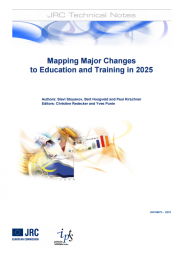
Mapping Major Changes to Education and Training in 2025

Preface
The Europe 2020 strategy acknowledges that a fundamental transformation of education and training is needed to address the new skills and competences required if Europe is to remain competitive, overcome the current economic crisis and grasp new opportunities. However, to determine how education and training policy can adequately prepare learners for life in the future society, there is a need to envisage what competences will be relevant and how these will be acquired in 2020-2030.
To contribute to this vision-building process on ways of addressing emerging competence needs, JRCIPTS in collaboration with DG Education and Culture launched a foresight study on “The Future of Learning: New Ways to Learn New Skills for Future Jobs”, in 2009. This study continues and extends work done in 2006-2008 on “Future Learning Spaces” (Punie et al., 2006, Punie & Ala-Mutka, 2007, Miller et al., 2008). It is made up of different modules which will be completed during 2010 and 2011. The modules will include a series of stakeholder consultations, involving different target groups ranging from policy makers, and scientists to educators and learners.
The overall objective of the study is to contribute to the development of imaginative visions and scenarios of the future of learning in order to support priority setting for education, training and skilling policies (http://is.jrc.ec.europa.eu/pages/EAP/ForCiel.html). A first series of expert consultations have been commissioned to a consortium led by TNO of the Netherlands with partners at the Open University of the Netherlands and Atticmedia, UK. As a first step in this series of vision building exercises, a targeted and structured stakeholder consultation was undertaken by staff at the Open University of the Netherlands, involving a focus group of 13 external experts from different fields, including social sciences, education, technology and also industry. This report presents the findings of this consultation process, which employed the Group Concept Mapping (GCM) methodology to come up with a map of thematic clusters indicating major changes to be expected to education in the next 20 years.
The Joint Research Centre – Institute for Prospective Technological Studies of the European Commission maintains the intellectual property rights of this report.
- Issue:
- Education
- Region:
- Europe
- Year Published:
- 2010
- Authors:
- Christine Redecker, Yves Punie, Slavi Stoyanov, Bert Hoogveld, Paul Kirschner
- Institutions:
- Institute for Prospective Technological Studies (IPTS), European Union (EU), Joint Research Centre (JRC), European Commission

